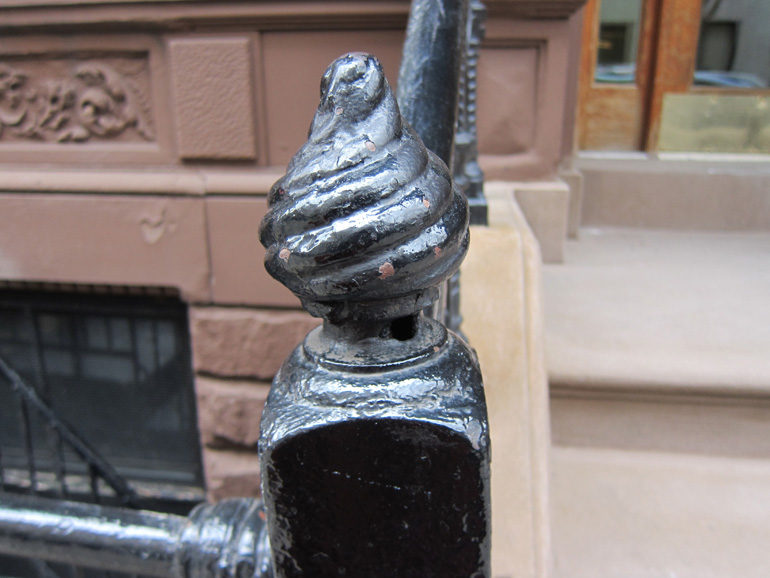
We apologize for the outages these days; we’re assured that there won’t be any more. Not for a while, anyway.
Not that I have much to report this morning — or, rather, much time for reporting. I’ll have to fill in this entry later this afternoon. We were out late last night, Kathleen and I, and the evening was so exhilarating — Gil Shaham playing the Brahms Violin Concerto with Orpheus was an experience without parallel in the concert hall, although I was often reminded of extremely tight jazz sessions — that I had no desire to be a good boy and go to bed when I got home. So I sat up reading a preposterous but amusing article about The Quilted Giraffe, a restaurant that Kathleen and I never tried (thank heaven, I can say now) in the current issue of Town & Country. Even that was exhilarating.Â
***
But before I get to last night, I want to say a few more words about Jennifer Egan’s novels, and the powerful sense that I have of understanding them, at long last. I should begin by saying that I knew along that the problem was with me. Egan’s books are subtle and sophisticated, but they are not hermetic puzzles that yield secret meanings only to those who know how to hold them upside down in just the right light and squint. Her fiction is as straightforward as it appears to be. The problem at my end was that I was picking up a strong signal that I didn’t know how to interpret. I only knew that I was receiving it. I was sure of that; I was sure that I wasn’t reading in a significance that wasn’t really there. The signifier was in plain sight. But then so was everything else in Egan’s rich fictions, with their occluded plots, layered timelines, salient recursions, and fertile lacunae. There was so much to see. And I understood most of it. But I was persistently aware of not understanding something that I was seeing.
And then, as I wrote yesterday, it came to me. Literally: the sentence drifted through my mind and into the paragraph of a letter. Only when I’d written it down did I grasp its significance — which turned out to be the significance that I’d been hunting ever since I was first beguiled by A Visit From the Goon Squad. Rather, I grasped that I had a handle on it. The handle was the term “American exceptionalism.” I’ve moved beyond that; I don’t believe that Egan’s characters could not behave as they do if they were not American. (We live in globalizing times.) If I’ve held on to “exceptionalism,” it’s because the term took me to the image that seemed to explain everything. Jennifer Egan presents her characters as they see themselves in the mirror after they’ve done their primping and are ready to go out the door — at their most self-confident, that is — but she is able, as if writing in some sort of stereophonic parallel text, to accompany this image with a morally grounded critique (a quiet demolition, really) of the rationalizations and petty dishonesties that underlie that self-confidence. Egan’s characters are glamorous because they’re all con men, and they’re sympathetic because they’re all their own greatest marks. Here, at the very beginning of Goon Squad, is one of the novel’s major characters, Sasha, roiling in the backwash of her bad little habit of stealing other people’s unconsidered trifles (sometimes not so trifling), which her analyst (whom she calls Coz) has just asked her about.
Sasha turned her face into the blue couch because her cheeks were heating up and she hated that. She didn’t want to explain to Coz the mix of feelings she’d had, standing there with Alex: the pride she took in these objects, a tenderneess that was only heightened by the shame of their acquisition. She’d risked everything, and here was the result: the raw, warped core of her life. Watching Alex move his eyes over the pile of objects stirred something in Sasha. She put her arms around him from behind, and he turned, surprised, but willing.
One of the elements of that “something” that stirred in Sasha is a feeling that everything is okay, or will be okay if she can change the subject, which she does by distracting Alex, the young man whom she has brought home from a bar, from the virtual shrine to kleptomania that has accreted in a corner of her Lower East Side flat — a place about which she has paralytically mixed emotions.
In fact the whole apartment, which six years ago had seemed like a way station to some better place, had ended up solidifying around Sasha, gathering mass and weight, until she felt both mired in it and lucky to have it — as if she not only couldn’t move on but didn’t want to.
Never once in this entire chapter (or elsewhere in the book that I can think of) are we invited to feel sorry for Sasha. She’s a big girl, and a clever girl; she can take care of herself. She can afford to “risk everything” with a little light-handed thievery. She is an exceptional girl: the ordinary rules manifestly don’t apply to her. Do they? That’s really whatA Visit From the Goon Squad is about. I’ve said that Egan weighs her characters with a morally-grounded critique, but she is no moralist. Some of her characters get away with murder. Others don’t.
***
About last night: Orpheus began its — what, 39th? season — at Carnegie Hall with what looked to be a very pleasant program; it turned out to be rather more. It opened with Mendelssohn’s Fair Melusine Overture, a trim tone-poem inspired by a legend that Goethe retold in Wilhelm Meister. I hadn’t heard it in years; I couldn’t remember a thing about it. But it turned out that every note was familiar, because works of its charm (considerable) and length (ten minutes or so) were invaluable to me in my radio days, when I had to schedule forty-eight minutes of varied music for every hour, with at least three breaks for commercials. What I really remembered, though, was the little old Jewish emigrant who did something mysterious at the Wall Street bank where I worked for a few summers in my teens. When she learned that I was developing an interest in Wagner, she heaped as much scorn and contumely on the wizard of Bayreuth as she could muster, and certainly one of her most considerable charges, quite aside from Wagner’s concededly posthumous popularity with certain Nazis, was his musical plagiarism, particularly his theft from a Jewish composer — Mendelssohn. I didn’t know what she had in mind at the time, but it came back and hit me when I heard Fair Melusine the first time. By then, I was an aficionado fo the Ring cycle, and it was obvious that Wagner had stolen the whole rolling Rhine motif from Mendelssohn’s overture. It still seemed obvious last night, although I know that musical creative lightning strikes twice a lot more often than you might think, meaning that it strikes two minds at the same time. From what I know of Wagner, it wouldn’t be surprising to hear him defend his theft as an improvement begging to be made upon the original.
I thought about that, and how different things were then; the War hadn’t been over for twenty years. I thought about how dingy Carnegie Hall was in those days; it was slated for demolition as soon as Lincoln Center, rising amidst slum clearance to the northwest, was completed. Looking at it today, with its gilt and its plush as opulent as can be, I can hardly believe that it was such a dreary old barn when I was a kid. Some things really do get better!
I can’t be sure whether it was in 1961 or 1962 that I was taken to Carnegie Hall for the first time, but it was about fifty years ago. Carnegie Hall was only seventy years old when I made my debut as a member of the audience. Seventy years seemed a much bigger number then than it does now, and fifty years — well, fifty years is about how long I’ve been doing everything that interests me.
The composer of the next piece on the program was sitting a few rows ahead of us, and on the other side of the aisle. Cynthia Wong was born in New York in 1982; she’s not even thirty. Her composition, Memoriam, commissioned by Orpheus, was given its first New York performance. The dedication, printed in the program booklet, began with an address to her father, dead of cancer, and the music that followed was at least as effective a tone poem (in this case about hospital corridors and chemotherapy) as Mendelssohn’s. I didn’t understand Memoriam in any formal way, but I was happy to listen to it, and my only objection, one of aesthetic economy, was that the score didn’t make enough use of the vibraphone or the tubular bells to warrant, so to speak, the rental. It was grand to see Laura Frautschi in the concertmaster’s seat; I missed her last season.
Then, Haydn’s 73rd Symphony, La Chasse. I wondered if I knew it. I know all of Haydn’s Paris and London symphonies, of course, and a sprinkling of earlier ones, but not in any systematic way; I seem to be saving the methodical comprehension of Haydn’s symphonic development for a rainy day. I misread the program note, which said something about La Fedeltà premiata, one of Haydn’s operas. I don’t know any of Haydn’s operas; I’ve never really given them a chance. I have enough trouble with Mozart’s early operas, and Mozart really knew what he was doing (eventually). But I know La Fedeltà premiata for precisely the same reason that I know Fair Melusine. An overture by Haydn! Aside from his symphonies, quartets, and sonatas, what Haydn wrote was for the most part much longer than twenty or twenty-five minutes a pop. As I say, I misread the program. It said something about how Haydn had later recycled the opera overture into the 73rd symphony. I assumed that this would be the first movement, which, as it played — very agreeably, of course — I didn’t recognize. It was only when the bumptious finale began that I realized my mistake. That was the overture. How like Haydn.
After the interval, Gil Shaham played the Brahms violin concerto. That’s why we went to the concert. The weather was damp and dreary, and Kathleen was exhausted; she could hardly keep her eyes open on the train. (How do you get to Carnegie Hall from Yorkville? Unless you’re an idiot, you take the 6 and then the N or the R.) But we’d been wholly wowed by Mr Shaham’s performance, a few seasons back, of Beethoven’s violin concerto. That was when Orpheus was beginning to play big-boy stuff that was considered beyond the reach of a conductorless “chamber orchestra.” Brahms’s concerto is about a million times more challenging than Beethoven’s in this regard, if you ask me, because Brahms is always playing rhythms off against one another, and who’s going to keep track of what’s going on if not an overall music director?
The Brahms violin concerto is one of the most beautiful in the world, perhaps the most beautiful, and I am always happy to sit back and enjoy it. But sitting back was not permitted last night. Here’s what happens when there’s no conductor to direct the traffic: the orchestra and the soloist morph into a gigantic jazz band and the familiar score becomes a series of astonishing riffs. Never has my little brain followed music in a concert hall with so little internal distraction. It’s very hard to write about how great performances “make it new,” but a homely image that comes to mind is that of an imaginary machine that rolls along ripping up old roadway at one end while laying down new pavement at the other. You know the music; but you don’t know this music. The musicians are tearing it apart in the very act of putting it together.
I’ve heard lovelier violin playing than Gil Shaham produced last night, and there were more than a few squeaks in his upper register, at least in the early part of the performance. But the beauty of the concerto, and the beauty of violin playing — these were exploded and reconstituted along with Brahms’s score. Certainly some of the most beautiful moments were the quietest ones. How softly can you play an instrument in Carnegie Hall, filled with a thousand odd people, and still be heard? Very softly. It was a curious miracle, how silent the room was, but for the gossamer silver threads of tone that spun from Mr Shaham’s violin. They were the only sounds in a zone of absolute quiet. (Even the subway was stilled.) Aside from that, all I can say was that soloist and orchestra exercised a collegiality that I’m quite sure would have amazed the composer. Certainly they threw the schoolbook notion of the concerto as a form of conflict right out the window. It clearly meant something that Mr Shaham was wearing what all the Orpheus men wore: a dark suit, a dark shirt, and a silver tie. He was One Of Them. I’ve never seen anything like it in my life.
And the fans went wild: it was one of those ballpark evenings at Orpheus. Orpheus audiences can outshout and outwhistle the opera queens any old time.




















